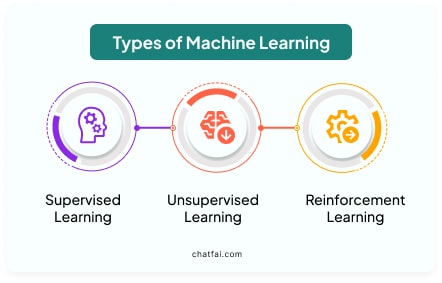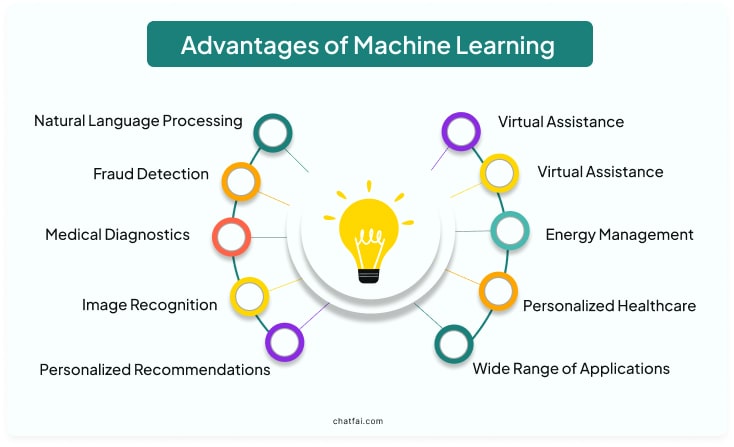Machine learning is changing how things work in many areas. It uses algorithms that learn from data to improve systems without constant programming. This helps with everything from suggesting movies you might like to improving how doctors diagnose illnesses.
Let’s explore eleven advantages of machine learning and how it is making a difference in our lives.
Machine Learning – All You Need to Know!
Machine learning allows computers to learn and make decisions without being explicitly programmed for each task. Instead of telling a computer exactly what to do, we give it many examples and let it figure out how to do things independently.
It’s like teaching a kid by showing them many pictures of animals and letting them learn to tell a cat from a dog by themselves. You got the point, right?
Machine Learning Vs Artificial Intelligence
Many people think that these two are the same thing. But are they? What makes machine learning different from Artificial Intelligence (AI)?
Artificial Intelligence (AI)
AI is about making computers, phones, or any other gadget smart like humans so they can do things that usually require human thinking. This includes understanding languages or recognising faces. Making digital avatars, generating art, writing scripts and music, and guess what?
You can even play games with AI.
AI is also changing the game in the entertainment sector. You can create characters for your movie and ask AI to write scripts and music.
Pro Tip: AI in entertainment is making things swing. Want to know how? This guide is for you!
Machine Learning
ML is a way to make AI work. It’s about teaching computers to learn from examples and data to improve their performance without being programmed for everything. Hmmm, interesting!
So, AI is like the big idea of making gadgets smart, and machine learning is one way we can achieve that by teaching computers to learn and improve tasks independently.
Types of Machine Learning

Machine learning has three main types:
1. Supervised Learning
This type learns from labelled data, where each example has a known answer. The algorithm aims to learn the relationship between inputs (temperature and humidity) and outputs (rain or no rain).
For example, it can classify emails as spam or not or predict house prices.
2. Unsupervised Learning
Here, the algorithm works on data without answers. It looks for patterns and groups within the data. It’s like finding customer similarities based on their buying habits without knowing their names.
3. Reinforcement Learning
This type involves learning by trial and error. An agent learns to make decisions by interacting with an environment.
Think of teaching a robot to walk: it tries different movements and learns what works through experience.
These methods help AI become what it is.
11 Top Advantages of Machine Learning
Now, let’s move to the most important part: the advantages of Machine Learning.

Here are some of these:
1. Personalized Recommendations
Personalised recommendations are like Netflix suggesting movies or shows based on your previous watch. It’s all about using computer programs to look at what you’ve done online, like the things you’ve clicked on or bought—and then making suggestions that match your interests.
It’s like having a brilliant friend who knows exactly what you might like and gives you tips based on what you’ve done in the past.
2. Fraud Detection
Machine learning helps banks and online services detect fraud by examining large amounts of data to determine what’s normal for each customer. It also learns your usual spending habits, such as how much you typically spend and where you shop. Interesting, right?
 It raises a flag when it sees something unusual, like a big purchase in a different place or many transactions in a short time. This quick alert helps banks stop fraudsters before they can take much money.
It raises a flag when it sees something unusual, like a big purchase in a different place or many transactions in a short time. This quick alert helps banks stop fraudsters before they can take much money.
3. Medical Diagnostics
Machine learning helps doctors diagnose diseases by looking at much medical information. This includes patient records, X-rays, MRIs, genetic details, and symptoms. The algorithms learn from all this data to find patterns that might show different illnesses. They can spot things that might be hard for humans to see.
This helps doctors make more accurate diagnoses and do them faster than before.
4. Natural Language Processing
Machine learning helps computers understand and generate human language to mimic how people communicate. For understanding language, ML algorithms learn from lots of text data to recognise patterns and meanings. This allows voice assistants like Siri or Alexa to understand spoken commands and give accurate answers.
You get the point.
They get better at understanding different accents and ways of speaking over time.
5. Image Recognition
Machine learning helps computers recognise objects in photos and videos by showing them many labelled images. These images show different things, like people, animals, cars, and more. Hmmm, interesting!
This technology is used in security to spot suspicious activities in airports or banks. It helps security teams respond quickly to keep people safe.
In healthcare, machine learning can analyse medical images like X-rays to help doctors find problems like broken bones or illnesses.
6. Virtual Assistance
Machine learning helps virtual assistants like chatbots by teaching them to understand and respond to human questions better. These assistants use unique algorithms to recognise how people talk and determine their wants.
ML-powered virtual assistants have improved customer service by handling simple questions, such as checking on orders or providing information about products.
And the best part?
You can now create AI characters, chatbots or even art to make your fantasies come true. This all is happening because of ML.
To create any character, you can head to any AI tool. Let’s suppose it’s ChatFAI. You need to log in, and you can create a character of your dreams there. It’s that easy.
Pro Tip: Want to create your own character and don’t know how to do that? This AI character guide is for you.
7. Financial Services
Machine learning (ML) is changing how finance works by helping predict stock market trends and making it easier to approve loans. ML looks at past stock market data to find patterns and guess which stocks might go up or down.
When it comes to loans, ML checks how much money someone makes, their credit history, and how much they want to borrow. By looking at data from past loans, ML can predict whether someone will repay their loan on time, which is helpful and saves so much time. Great.
ML benefits both businesses and people. Businesses can manage their money better and offer loans more wisely.
Pro Tip: Did you know chatbots for businesses are a thing now? If not, we have gathered this information to keep you updated.
8. Energy Management
Machine learning helps manage energy more efficiently by using data to predict when and how much energy will be needed. This advantage of machine learning allows energy providers to adjust supply to meet demand, preventing waste and ensuring stable service.
Overall, ML in energy management improves efficiency, cuts costs, and helps protect the environment.
9. Personalized Healthcare
Machine learning makes healthcare more personalised by using each person’s unique health data to create treatment plans that fit them perfectly. It analyses a lot of information about a patient, like their medical history, genes, and lifestyle. Hmmmm!
ML can find patterns that help doctors make better decisions. This also helps doctors track patients’ progress and adjust their treatment plans as needed, leading to better overall outcomes and healthier lives.
10. Wide Range of Applications
Machine learning is used in many areas because it can analyse data, find patterns, and make predictions or decisions based on that information.
For example, in finance, it helps detect fraud and decide who should get loans.
It helps doctors diagnose and find the best treatments for patients.
In marketing, it’s used to understand customer preferences and recommend products.
In robotics, machine learning teaches robots how to see and move.
Insider Hack: Want to learn more about chatbots for fun? Hop on to this guide.
11. Continuous Improvement
As machine learning algorithms learn from more data, they better predict things like the weather. So, as you gather more information, your predictions become more accurate and faster. Sounds great, right?
Machine learning has changed things for the better. The advantages of machine learning have made everything easy for people. It helps in almost every field, from healthcare to finance.
Disadvantages of Machine Learning
Now that we have learned about the advantages of Machine learning. Let’s talk about some disadvantages as well.
| Disadvantage |
Explanation |
| Dependence on Data Quality |
ML models need good data; if the data is biased or incomplete, predictions can be wrong. |
| Complexity and Understanding |
Some ML models are hard to understand, making it tough to know how they make decisions. |
| Overfitting |
Models may fit too closely to training data, making them bad at predicting new information. |
| High Computing Needs |
Running and training complex models needs a lot of computer power and can be expensive. |
| Privacy and Security Risks |
Using personal data can raise concerns about privacy if it’s not kept safe or anonymous. |
| Ethical Concerns |
Using AI for decisions can be unfair or hurt some groups, raising questions about what’s right. |
| Maintenance Challenges |
Keeping models working well over time needs constant attention and expertise. |
Challenges and Limitations
Here are some of the challenges related to AI and machine learning:
- Data Dynamics and Imbalance
- Lack of Transparency
- Data Costs
- Ethical Implications
- Skill Shortage
- Data Storage Requirements
- Time Constraints
- Limited Predictive Accuracy
- Complexity with Large Data
- Verification Challenges
In a Nutshell…
Machine learning is like having a super-smart assistant that learns from examples to make life easier. It suggests movies you’ll love, helps doctors diagnose faster, and even predicts when energy will be needed. But like any tech expert, it has its quirks, like needing lots of good data and sometimes making decisions that need a human touch.
Still, it’s changing the game across finance, healthcare, and more, making our world brighter and more personalised daily!
Thank you for your time. We will meet next time with more notable advantages of machine learning.
FAQs
Q: What are the advantages and disadvantages of AI machine learning?
Advantages of AI and Machine Learning:
- Automation
- Accuracy
- Efficiency
Disadvantages of AI and Machine Learning
- Needs Good Data
- Complex Models
- Ethics Issues
Q: What is the main idea of machine learning?
Machine learning teaches computers to learn from examples and data to improve performance without being programmed for every task.
Q: What is the advantage of machine learning?
The advantage of machine learning is that it helps computers learn from data and improve their performance without needing constant programming for each task.
Q: What is machine learning, and why is it useful?
Machine learning teaches computers to learn from data and make decisions without being explicitly programmed. It’s useful because it automates tasks, improves accuracy, and handles complex data to solve problems more efficiently.
Q: What are the benefits of machine learning in education?
Machine learning in education personalises student learning and helps teachers improve their teaching methods. It also helps with tasks like grading and organising schedules, which saves time.